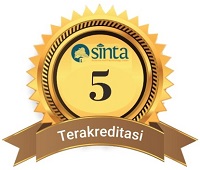EVALUATION OF VO2Max ATLET KARATE IN THE COVID-19 PANDEMIC ERA
Abstract
The research article analyzes the VO2Max level of Karate athletes. The purpose of this study was to determine the impact of independent training carried out by athletes due to the covid-19 pandemic on the athlete's physical status. The method used in this research is a quantitative descriptive method which is conducted as a total sampling of the Gorontalo Province PPLP Karate athletes in the January-December 2020 period of 6 female athletes and 7 male athletes. The findings of the study prove that there was a decrease in the average VO2Max of female athletes by 23% and male athletes by 18%. The application of various forms of training at this stage should be carried out under strict control by the trainer, so that the athlete in carrying out the training program is truly monitored directly and each athlete is serious in carrying it out.
Keywords
Full Text:
PDFReferences
Arikunto, S. (1993). Prosedur Penelitian Suatu Pendekatan Praktek. Jakarta: Rineka Cipta.
Beneke, R., Beyer, T., Jachner, C., Erasmus, J., & Hitler, M. (2004). Energetics of Kardte Kumite. Springer-Verlag. Europan Journal Appl. Physiologi 92:51 8-523.
Cade, W. T., Bohnert, K. L., Reeds, D. N., Peterson, L. R., Bittel, A. J., Bashir, A., Taylor, C. L. (2018). Peak oxygen uptake (VO 2peak) across childhood, adolescence and young adulthood in Barth syndrome: Data from cross-sectional and longitudinal studies. Journal.Pone, 1-12.
Chaabene, H., Hachana, Y., Franchini, E., Tabben, M., Mkaouer, B., Negra, Y., Hammami, M., & Chamari, K. (2015). Criterion related validity of karate specific aerobic test (KSAT). Asian Journal of Sports Medicine. https://doi.org/10.5812/asjsm.23807
Doria, C., Veicsteinas, A., Limonta, E., Maggioni, M. A., Aschieri, P., Eusebi, F., Fanò, G., & Pietrangelo, T. (2009). Energetics of karate (kata and kumite techniques) in top-level athletes. European Journal of Applied Physiology. https://doi.org/10.1007/s00421-009-1154-y
Muslima, T. F., & Himam, F. (2018). Peran Pelatih dalam Pembinaan Prestasi Atlet pada Organisasi Taekwondo Profesional. Gadjah Mada Journal of Professional Psychology (GamaJPP), 2(3), 186. https://doi.org/10.22146/gamajpp.41769
Ngoalo, S., Liputo, N., & Duhe, E, D, P. (2020). Shadow Boxing Terhadap Peningkatan Vo2max. JJSC: Jambura Journal of Sports Coaching, 2(1), 13-17.
Harsuki, H. (2003). Perkembangan Olahraga Terkini. Kajian Para Pakar. Jakarta: PT. Rajagrafindo Persada.
Harsono. (1988). Coaching dan Aspek-Aspek Psikologis dalam Coaching. Jakarta: P2LPTK Depdikbud Dirjen Dikti.
Harsono. (2004). Rencana Program Latihan. Edisi Kedua. Bandung.
James, M. (1984). World's Leading Magazine of Self-Defense. Black Belt. Burbank: Rainbow Publications. Inc.
Kemenegpora. (2005). Panduan Penetapan Parameter Tes Pada Pusat Pendidikan Dan Latihan Pelajar Dan Sekolah Khusus Olahragawan. Jakarta.
Kusnanik, W.N., Nasution, J., & Hartono, S. (2011). Dasar-Dasar Fisiologi Olahraga. UNESA Press.
Maksum, A. (2009). Metodologi Penelitian dalam Olahraga.Surabaya: UNESA Press.
Grosser, Starischka, and Zimmermann. (2001). Latihan Fisik Olahraga. Edisi Revisi (alih bahasa Pasurney, L.P.). Koni Pusat: P3 Bidang Penelitian & Pengembangan.
Roesdiyanto, & Budiwanto, S. (2008). Dasar-Dasar Kepelatihan Olahraga. Malang: Lab IKOR UNM.
Rudianto, D. (2010). Seni Beladiri Karate. Jakarta: Golden Terayon Press.
Sterkowicz & Franchini. (2009). Martial Arts and Combat Sports Research Group. Testing Motor Fitness in Karate. Brazil: School of Physical Education and Sport, University of Sao Paulo.
Sujoto, B. J. (2006). Teknik Oyama Karate: Kihon, Kata, Kumite. Jakarta: PT Elex Media Komputindo.
Wahid, A. (2007). SHOTOKAN. Sebuah Tinjauan Alternativ Terhadap Aliran Karate-Do Terbesar Di Dunia. Hak Cipta Dilindungi oleh Undang- undang.
Yoshimura, Y., & lmmamura, H. (2010). Effects of Basic Karate Exercises on Mmimal Oxygen Uptake in Sedentary Collegiate Women. Journal of Health Science, 56(6) 721-726.
DOI: https://doi.org/10.37311/jjsc.v2i2.7058
Refbacks
- There are currently no refbacks.

Jambura Journal of Sports Coaching (p-ISSN: 2654-3435 | e-ISSN: 2656-0437) is licensed under a Creative Commons Attribution-ShareAlike 4.0 International License.
Jambura Journal of Sports Coaching has been indexed by:
-------------------------------------------------- -------------------------------------------------- -------------------------------------------------- -----------------------------
-------------------------------------------------- -------------------------------------------------- -------------------------------------------------- -----------------------------
BERKOLABORASI DENGAN
















_-_Copy.jpg)